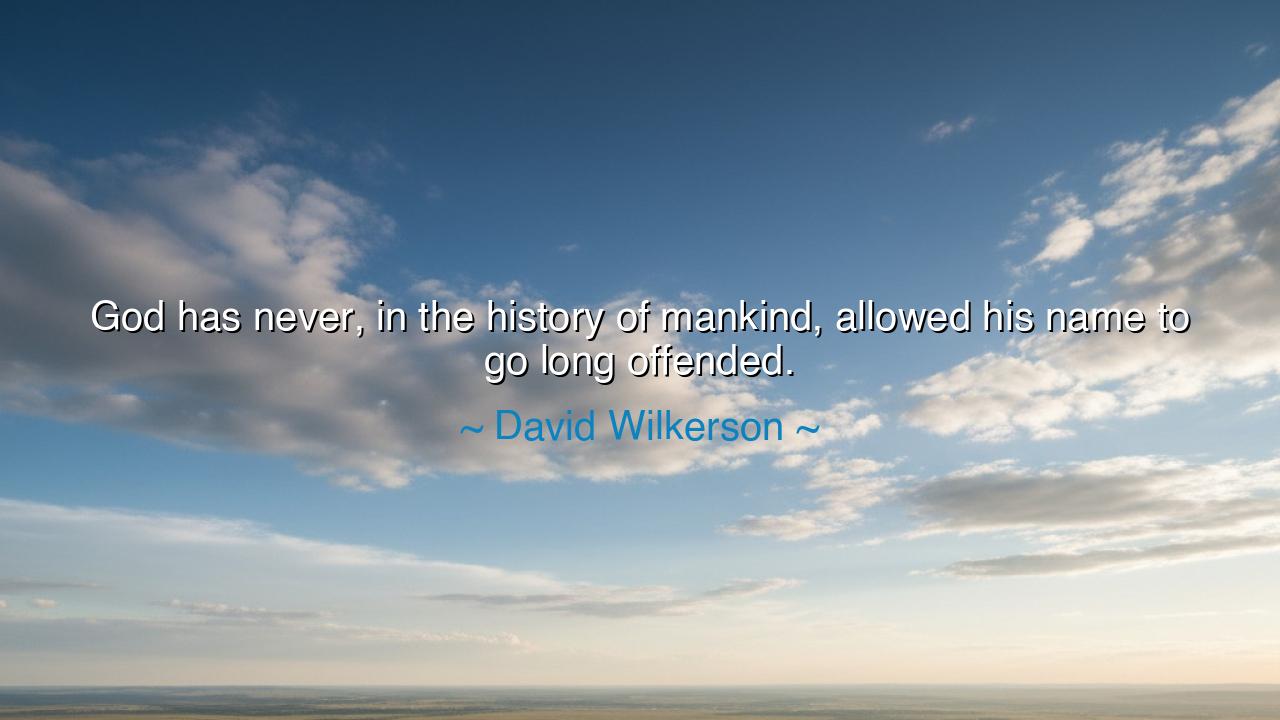
God has never, in the history of mankind, allowed his name to go






Hearken, O children of spirit and seekers of truth, and attend the words of David Wilkerson, who spoke with the solemnity of one who contemplates the justice and providence of the Almighty: “God has never, in the history of mankind, allowed his name to go long offended.” In these words lies a meditation upon divine justice, the weight of human sin, and the certainty that moral transgression is never left unaddressed in the vast chronicle of human history. Wilkerson reminds us that the Divine watches over the affairs of men, and that the balance of righteousness and consequence is eternal.
Wilkerson teaches that the offense against God is never trivial, nor is it overlooked. History itself serves as testament to this truth. Empires rise and fall, nations prosper and collapse, and civilizations endure trials and tribulations—all often as responses to moral failure or the collective turning away from justice. The name of God, representing order, righteousness, and moral law, is not lightly dishonored, and those who defy its call inevitably face reckoning. Divine oversight is constant, patient, yet inexorable.
Consider the story of ancient Israel, as chronicled in the sacred texts. The nation experienced cycles of obedience and rebellion, blessing and punishment. Kings and peoples alike were warned by prophets—Isaiah, Jeremiah, and Samuel—yet when the people turned away from justice, oppression, and idolatry, calamity followed. The Babylonian exile serves as a solemn example: the offense against the Divine order, sustained over generations, led to the loss of homeland and freedom, illustrating Wilkerson’s truth that God does not allow His name to remain long offended.
The lesson is not only historical but moral. Offense to God is not abstract; it is manifested in injustice, cruelty, and the erosion of ethical life. The consequences may be delayed, but they are not denied. In every society, patterns of corruption, oppression, and moral decay, if left unchecked, lead to collapse and suffering. Wilkerson’s words remind us that moral reckoning is a certainty, and that history itself records the consequences of collective transgression.
Consider the fall of Rome, which many historians attribute in part to moral and ethical decay. Greed, ambition, and cruelty permeated the governance of the empire, and corruption undermined civic life. The consequences—political collapse, social upheaval, and invasion—reflect the principle Wilkerson affirms: that when human beings offend the moral and divine order, even great power cannot forestall consequence. History is witness to divine justice expressed through the consequences of human action.
From this reflection flows practical wisdom: live with integrity, honor justice, and cultivate righteousness in thought, word, and deed. Recognize that personal and collective morality has consequences, and that divine law, whether understood through faith or ethical reflection, demands respect. Wilkerson’s insight calls for vigilance over one’s actions and the cultivation of a life that honors the principles of justice, mercy, and humility. Offense is never without consequence.
The teaching also inspires hope. God’s justice is certain, yet His guidance is merciful. History shows that repentance, reform, and adherence to divine principles bring blessing, restoration, and stability. The story of King Hezekiah, who turned from error and sought God’s favor, demonstrates that obedience and humility restore favor and avert calamity. Wilkerson’s words remind us that offense may provoke consequence, but virtue, faith, and righteousness invite restoration.
Thus, remember: God does not allow His name to remain long offended. David Wilkerson’s words teach that human action, collective or individual, carries weight, and that history reflects the certainty of moral consequence. Engage with life with reverence, integrity, and humility, honoring divine law and ethical principles, so that your path is not marked by destruction but by restoration and blessing. History, faith, and morality intertwine, and heeding their lesson safeguards both life and soul.
If you wish, I can also craft a more dramatic, audio-ready version, vividly illustrating the Babylonian exile, the fall of Rome, and Hezekiah’s restoration, making Wilkerson’s message emotionally and spiritually compelling for listeners. Do you want me to do that next?






AAdministratorAdministrator
Welcome, honored guests. Please leave a comment, we will respond soon